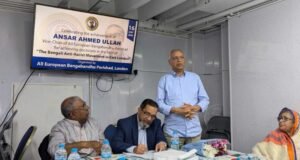On 18 May, the jury in the Central Lincolnshire Coroner’s Court found “inadequate” communication between multi-disciplinary teams was one of the factors that contributed to Rubel Ahmed’s death following the service of removal directions on him.
Rubel Ahmed was discovered hanging in his cell on 5 September 2014, a few days after being informed of the decision to remove him to Bangladesh. He was detained in Morton Hall Immigration Removal Centre, a former category B prison which still bears many of the hallmarks of its former function. An All Party Parliamentary inquiry panel and HM Inspectorate of Prisons have already expressed concerns about immigration detainees being held in prison-like conditions. A recommendation by the Inspectorate to stop locking Morton Hall detainees in their rooms in the evening and overnight remains unimplemented over two years after it was made in March 2013. Morton Hall’s Centre Manager accepted in her evidence that locking detainees in their rooms was a risk factor for them and that there were lessons to be learned from Rubel Ahmed’s death.
The jury returned an open conclusion alongside its critical narrative after hearing from Rubel Ahmed’s cousin, Aktarun Miah, who told the jury that she was left with the impression that Rubel had been regarded as “irrelevant” by those detaining him. She described Rubel as a gentle natured, caring and respectful person who should not have been locked up, and explained the impact on the family of what the Coroner described as a “very significant” delay in confirming Rubel’s death to them.
Staff at Morton Hall knew that detainees under their care were vulnerable, but there was no system or protocol in place for checking on Rubel Ahmed’s mental state after he had been told he would be removed to Bangladesh. Morton Hall’s Centre Manager said that staff were expected to assess his risk by noting changes in behaviour and persona, but those responsible for his welfare on the night of his death did not even know who he was. An off-duty member of staff had to be called in to identify Rubel Ahmed after he had died.
Experienced staff told the jury that they had not been trained in resuscitation techniques for several years and could not remember being trained in emergency responses to someone having been found hanging. They were unable to remember much of their training on working with immigration detainees as opposed to prisoners.
Mr Ajmal Ali, Rubel Ahmed’s cousin, said on behalf of the family, “As a family, Rubel’s loss has opened up a deep void in our hearts. The time we knew him was an honour and privilege as he always shone as a humble, shy, gentle and caring young man.
“Despite a thorough investigation by the police and PPO, we feel Rubel’s death has flagged up some serious issues around the application of prison protocols across immigration detention. In particular, locking Rubel up in his room early in the evening prevented him from being able to talk to his fellow detainees in the hours before his death leaving him alone with his own thoughts and worries. We believe that being unlocked would have made a difference to him that night.”
Clare Richardson, the family’s solicitor, said, “The jury heard that two of those responsible for Rubel’s welfare on 5 September 2014 had not received training in resuscitation techniques for over 10 years, and none of them could remember much of what they had been taught about working with immigration detainees. This reflected a wider malaise in the training regime at Morton Hall which needs to be addressed urgently by the Ministry of Justice”.
An organisation INQUEST had been working with the family of Rubel Ahmed since September 2014. The family was represented by INQUEST lawyers Group members Clare Richardson of Bhatt Murphy Solicitors and barrister Una Morris of Garden Court Chambers.
 Weekly Bangla Mirror | Bangla Mirror, Bangladeshi news in UK, bangla mirror news
Weekly Bangla Mirror | Bangla Mirror, Bangladeshi news in UK, bangla mirror news







